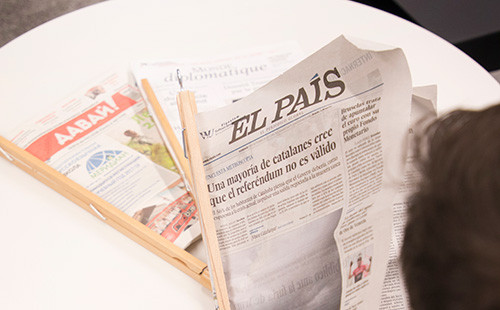Coming to terms with WU’s history: Contemporary witnesses discuss the Borodajkewycz case
Fifty years ago this year, the University of World Trade (Hochschule für Welthandel) was the subject of a public scandal: the Borodajkewycz case. Taras Borodajkewycz was an ardent supporter of National Socialism in the thirties and forties and a professor of economic history at the University of World Trade from 1955 – 1965. During this time, he repeatedly expressed anti-Semitic and pro-fascist sentiments in his lectures. An evening with Austrian President Heinz Fischer, Ferdinand Lacina, and Elisabeth T. Spira focusing on the events of that period will be held at WU in June.
In spite of his activities during World War II, Taras Borodajkewycz was appointed as a professor by the University of World Trade (as WU Vienna University of Economics and Business was then known) after the war. For a long time, there were no complaints about the anti-democratic, anti-Semitic, and racist statements he made during his lectures. His problematic attitude towards history and politics did not become a matter of public record until Heinz Fischer, a young lawyer (now President of Austria), wrote a newspaper article accusing him of encouraging a resurgence of National Socialism. His accusations were based on lecture notes taken by Ferdinand Lacina, then a student at the University of World Trade, who later became the Austrian Minister of Finance.
Student protests with fatal outcome
The Borodajkewycz case was not only a matter for the Austrian courts, it was discussed in both the national and international media and was the subject of heated political debate at the municipal and national levels. The debate focused mainly on the question of to what extent the democratic foundations of the Second Austrian Republic were endangered by unrepentant National Socialists and neo-Nazis. The protests resulted in a demonstration held in the center of Vienna on March 31, 1965. During the demonstration, Ernst Kirchweger, a former resistance member and concentration camp survivor, was attacked by a member of a radical right-wing student organization and later died of the injuries he sustained. Kirchweger was the Second Republic’s first victim of a politically motivated crime.
Event with President Fischer and Ferdinand Lacina
“It is our responsibility to society to confront these dark chapters that are part of every university’s past. The events that occurred during and after the national socialist period in Austria must never be repeated, and we must help make sure that they don’t,” says WU Rector Christoph Badelt. Now, 50 years after the fatal attack on Kirchweger, an event will be held focusing on the case. The event will look at topics like the social climate that allowed a university professor who refused to distance himself in any way from national socialist ideology to thrive. Further questions for discussion include: How did the University of World Trade deal with the continuity between the national socialist period and the Second Republic as embodied by Borodajkewycz? How did contemporary witnesses experience the affair at the time, and what is its significance for Austria’s post-war history?
At the public event on June 9, the contemporary witnesses Heinz Fischer, Ferdinand Lacina, and Elisabeth T. Spira will share their recollections of the occurrences in 1965. Further details about the event will be announced in late May.
Coming to terms with WU’s history: Commemorative project and memorial
This event is part of the larger context of WU confronting its own history. In 2012, WU launched a research project investigating the history of the then University of World Trade at the time of the Anschluss and the NS regime. A memorial was erected in a central location on the new Campus WU in commemoration of the students and faculty of the University of World Trade who were persecuted, displaced, or murdered. The sculpture, a steel sphere made up of the names of the victims, was created by artist Alexander Felch and is now an integral part of the campus. The sphere was deliberately left incomplete to allow for further names to be added as they are discovered. The biographies of the victims have been collected in a virtual, online memorial book under http://gedenkbuch.wu.ac.at/. In addition, the university library is also conducting an investigation into whether its collection contains any works confiscated by the Nazis during the war.
University Archives supporting research efforts
The WU University Archives, located in the Central Library, is also systematically going through historical images and documents of WU and its predecessors, the Imperial Export Academy (founded in 1898) and the University of World Trade (as it was re-named in 1919). In addition to cataloging archivable materials, the University Archives are responsible for introducing WU’s history to the public. Exhibitions, scientific conferences, and publications all provide opportunities to analyze and present the Archives’ collection. The commemorative project, the library collection provenance project, and the Borodajkewycz case all show just how important it is to take a look at aspects of WU’s past in their historical contexts.
The Borodajkewycz case with Heinz Fischer, Ferdinand Lacina, and Elisabeth T. Spira
Location: Ceremonial Hall 1 in the Library and Learning Center
http://campus.wu.ac.at/?roomShow=LC.0.110%20Festsaal%201
Contact:
Press Relations Officer
Tel: + 43-1-31336 ext. 4977
cornelia.moll@wu.ac.at
